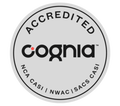EDUCATIONAL ENRICHMENT
The Educational Enrichment program at Summit Christian Academy is based on research proving that students with cognitive processing weaknesses can be strengthened. Using proven methodologies and research based best practices, certified therapists meet with students one-on-one to mediate and change the thinking process. Students become independent learners able to reach their full potential and achieve success in the academic world and in life.
Educational therapy focuses on improvement of a person’s areas of difficulty in perceptual and cognitive functioning using 26 established techniques tailored to the student to strengthen those deficit areas. It is non-tutorial in that it does not address specific school subjects, but rather promotes independent and active learning through cognitive modification.
Educational Enrichment techniques address:
Learn more about Educational Enrichment by clicking on one of the topics below.
Educational therapy focuses on improvement of a person’s areas of difficulty in perceptual and cognitive functioning using 26 established techniques tailored to the student to strengthen those deficit areas. It is non-tutorial in that it does not address specific school subjects, but rather promotes independent and active learning through cognitive modification.
Educational Enrichment techniques address:
- Perception (accurately receiving information through the senses)
- Cognition (accurately acquiring information and understanding through thought)
- Processing Speed (the pace at which one receives information, thinks about it, and responds to it)
- Working Memory (the ability to hold onto information while making sense of it)
Learn more about Educational Enrichment by clicking on one of the topics below.
search & teach
SEARCH and TEACH was developed by child psychiatrist Archie Silver, M.D. and psychologist Rosa A. Hagin, Ph.D., and the staff of the Learning Disorders Unit at the New York University School of Medicine. It is based on extensive interdisciplinary research on the diagnosis and treatment of learning disorders.
SEARCH is an early identification testing instrument for children 5 and 6 years of age. The test content is designed to survey perceptual and neuropsychological functions basic to learning. This scan provides a total score to assess vulnerability to educational failure.
TEACH is a program that prioritizes pre-reading tasks from simple to complex and organizes them into a practical plan of five clusters as ascertained by the results of the SEARCH scan. These clusters include:
SEARCH is an early identification testing instrument for children 5 and 6 years of age. The test content is designed to survey perceptual and neuropsychological functions basic to learning. This scan provides a total score to assess vulnerability to educational failure.
TEACH is a program that prioritizes pre-reading tasks from simple to complex and organizes them into a practical plan of five clusters as ascertained by the results of the SEARCH scan. These clusters include:
- Visual
- Visual-motor
- Auditory
- Body-image
- Intermodal skill clusters
FIE
FIE (Feuerstein Instrumental Enrichment) was devised after World War II by Reuven Feuerstein, a child psychologist. Feuerstein believed that intelligence is modifiable (neuroplasticity) and FIE can help all learners improve the way they learn.
The focus is on HOW to learn rather than on WHAT to learn.
FIE is a cognitive intervention program. Consisting of specially designed instruments, FIE is a series of pencil-and-paper tasks that may be mediated in a classroom, group or individual setting. Each series focuses on a different cognitive skill, creating systematic, persistent and structured conditions to engage learners in problem-solving by developing their ability to understand and elaborate information.
The focus is on HOW to learn rather than on WHAT to learn.
FIE is a cognitive intervention program. Consisting of specially designed instruments, FIE is a series of pencil-and-paper tasks that may be mediated in a classroom, group or individual setting. Each series focuses on a different cognitive skill, creating systematic, persistent and structured conditions to engage learners in problem-solving by developing their ability to understand and elaborate information.
academic support
During the pandemic of 2020, and the subsequent time of distance learning, it became clear that some SCA students and their parents/legal guardians needed additional help to create a plan for academic success. In order to more fully partner with these families, coaches stepped in to assist the student in prioritizing, planning, and accountability.
Academic Support aids the student in the following:
Academic Support aids the student in the following:
- Developing a plan to ensure work is done well, adheres to instructions of teachers, and is turned in on time
- Identifying habits that prohibit successful completion of work and creating plan to reform unhelpful habits
- Creating a manageable calendar of work milestones and deadlines so student is not overwhelmed by workload
- Providing accountability for students’ goals
READING INTERVENTION
The SCA Grammar School (K4-6) discovered that some students who did not qualify for full educational therapy were missing important pieces in their ability to decode text, read fluently, and/or comprehend the material read. A Reading Interventionist (RI) meets with grade-based groups of struggling readers. The RI uses proven strategies to fill gaps in understanding and strengthen weak reading skills.
MATHEMATICS INTERVENTION
The SCA Grammar School (K4-6) discovered that some students who did not qualify for full educational therapy were missing important pieces in their number sense, being able to use mathematical operations, and/or grasping mathematical reasoning. A Mathematics Interventionist (MI) meets with grade-based groups of struggling math students. The MI uses proven strategies to fill gaps in understanding and strengthen weak mathematics skills.







